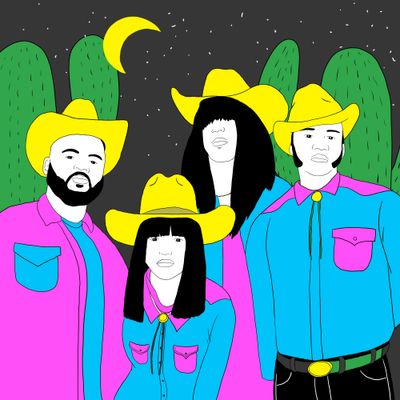
Fort Worth, Texas’s own Leon Bridges combines retro sounds with contemporary production. Houston-based power trio Khruangbin (Mark Speer on guitar, Laura Lee on bass, and DJ Johnson on drums) play a unique brand of funky, dreamy psychedelia. In 2020, they teamed up to release the EP Texas Sun, whose title track conjured both spaghetti-Western soundtracks and classic soul. Now, the quartet is back with another collaboration, Texas Moon, which invokes the musical palette of their first release and inverts its lyrical themes. Switched on Pop’s Nate Sloan spoke with them about it and all things Texas.
Texas Sun was a fun EP and a great success. What made you decide, Okay, it’s time to join forces once again and put another EP out into the universe?
Leon Bridges: Honestly, getting together with Khruangbin and making music have been some of my favorite experiences as far as being in a studio. So it was just about getting back together with the family and making good art.
What do you think it is that allows you four to work so seamlessly together?
Mark Speer: We spent some time on the road, and we had laughs, a lot of love — you know what I’m saying? It’s one of those things. Sometimes we get requests for folks to collaborate. It’s like, I’ve never met you. I don’t know you. I don’t really know what your vibe is. Leon was just instantly family.
Laura Lee: There’s so many different kinds of people, and I think sometimes you work with people and it feels clunky — it feels like you’re stepping on each other and your ideas don’t fit. This project is not easy, because making an album is always challenging, but it just fit. And I think that part of it was not a struggle.
DJ Johnson: Also, I think all of us being collectively from Texas, when we get in the studio with Leon, it’s that same feeling that you have when Thanksgiving rolls around and all of your cousins come over and you get to hang out with all your cousins. Leon is like a cousin.
Let’s talk about a track from Texas Moon called “Chocolate Hills.” What was the spark for this song?
L.L.: There were a number of songs on both EPs that came about because Leon is constantly singing and dancing. If there’s any kind of dead space, Leon will get out a guitar and start playing and singing. And so [recording engineer Steven Christensen] realized that quickly and made sure there was always a mic around Leon so that if Leon kind of started doing that, we captured it. And a few of the songs were composed by basically taking Leon’s vocals from those takes and then Khruangbin writing around those vocals.
M.S.: There was a way that Leon sang it where there was no pressure — it was a really easy sound of you singing and playing this thing. So all I really wanted to do was maybe reharmonize a few of the chords and really accentuate this transient, hypnotic feeling that was going on. It didn’t need a lot.
It’s not often that you hear gaps of silence and space in a track. Was it hard to resist the temptation to put more into the song, to just keep layering and overdubbing?
L.B.: With my voice, I’m sometimes doing a lot, and too much texture just overshadows it, you know? The less things are going on, the more of my voice is kind of able to shine. And I think we all came to understand that staying out the way could bring the track to life.
D.J.: I’m a big fan of uncomfortable space on records.
This interview has been edited and condensed for clarity.

